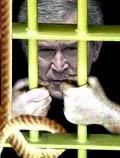| Find |
Friday, 22 February 2008
Recipe for disaster
According to insiders in the movement's higher echelons, the conference has been postponed "until further notice". In Fatah-speak, this probably means "never".
Many of Fatah's younger leaders and activists had hoped and probably still hope that the organisation of the conference would provide a rare opportunity to put Fatah's house in order and introduce badly-needed democratic reforms to a movement that is increasingly suffering from a host of ailments, including corruption, rampant factionalism and demoralisation.
However, Fatah's veteran leaders, especially at the national level, have been resisting and effectively opposing internal elections because of the impossible situation on all fronts; namely, the enduring rift between Fatah and Hamas, the precariousness of the "peace process" with Israel, and the widespread malaise in Palestine and the region as a whole. Still, Fatah's internal disunity remains the most serious factor hampering the convening of the conference at this time.
There are some veteran Fatah leaders in the West Bank, people like Qaddura Fares and Jebril Rajoub, who are worried that holding the conference under existing circumstances might cause an implosion within the movement. "We can't convene the sixth conference now with all these internal differences. Because then instead of achieving unity, we would be consolidating disunity and Fatah would come out of the conference in much worse shape," said Fares.
He pointed out that Fatah might be better off "patching up" its differences by way of reconciliation rather than elections. But reconciliation according to whose criteria? That is the question for which no one seems to have a satisfactory answer.
None of this talk seems acceptable to the younger Fatah leaders who accuse the veteran leadership of wanting to remain in their seats forever. "They are all liars, in any company, let alone a political movement or a political party. Managers don't remain in their seats for 20 years. How can we compete with Hamas if our leaders remain in their seats till they are senile or dead?" asked Jamal Qawasmeh, a local Fatah leader in the Hebron region. "Authoritarianism has harmed Fatah so much, and if it persists unchallenged, it could very well bring about Fatah's demise." AL-AHRAM
Posted at
14:54
![]()
Post Title: Recipe for disaster
![[Zionazis-1.jpg]](https://blogger.googleusercontent.com/img/b/R29vZ2xl/AVvXsEg_x8DOGucgHQmfJJujuK_oYJdxhEnskhQqt-Og7lSk52HeaDQYzW8NQWfdpHmPgj_FJN0jJ3tz1prR1jVZHdHky2HDQxxcs4LVxX0DtAt3fG0sfRr6MDx7Sz8cJNjl0k0RS9TbCjangQ/s1600/Zionazis-1.jpg)




